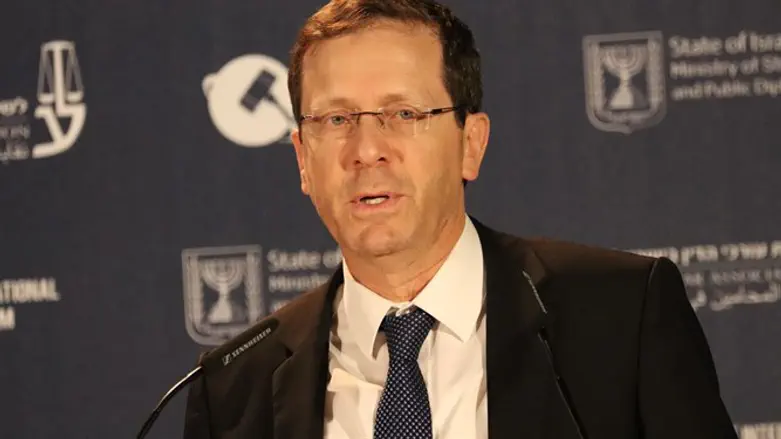
The Jewish Agency is set to approve a strategic action plan for the coming decade, designed to address the major challenges currently facing the Jewish people.
Mapping the challenges and resulting actions were formulated through a global process, the first of its kind among the Jewish people, that was conducted in recent months by the Chairman of the Executive, Isaac Herzog, along with the Chairman of the Board, Michael Siegel, the Jewish Agency CEO, Amira Aharonovich, and Beth Kieffer Leonard, Member of the Board of Governors.
The new plan will be approved by the Jewish Agency Board of Trustees which will convene in Jerusalem for three days starting on Sunday, attended by hundreds of Jewish community leaders from around the world.
Jewish leaders attending the Board of Governors will hear from Prime Minister Binyamin Netanyahu and Blue and White leader MK Benny Gantz, who are expected to address, among other topics, the challenges of rising anti-Semitism and securing Jews wherever they may be in the world.
According to the strategic plan, The Jewish Agency will work to ensure the safety of Jewish communities around the world and fight vigorously against the manifestations of anti-Semitism and anti-Zionism that reached new heights in recent years. In addition, The Jewish Agency will focus on encouraging Aliyah and assist those who make Aliyah of-choice, while also conducting clandestine emergency Aliyah operations. Over the next decade, The Jewish Agency will also engage in mending the rifts between the Jewish people by reinforcing the affinity of world Jews towards each other and the State of Israel, while building a two-way bridge between world Jewry and Israel. The Jewish Agency will also represent the different voices of global Jews to Israeli policymakers and within Israeli society, while ensuring the involvement of world Jewry in shaping the face of Israeli society.
The strategic plan guidelines were formulated in recent months through an ongoing process led by Jewish Agency leadership headed by Chairman Herzog, in collaboration with its partners in the Jewish Federations of North America (JFNA), the World Zionist Organization and Keren Hayesod, and in collaboration with the members of The Jewish Agency's Board of Directors, the organization's management and its employees.
As part of this process, the best minds among the Jewish people and hundreds of leaders of Jewish communities and organizations from different continents around the world and Israel held a unique, joint discussion, aiming to identify the major challenges facing the Jewish people at this time and point out the unique role The Jewish Agency can play in addressing these challenges in coming decade. The conferences, held in New Jersey, USA and Milan, Italy, were nicknamed The Lab and conducted under sterile conditions, with no mobiles or laptops allowed in the convention hall to enable participants to fully devote themselves to the collaborative effort.
As part of the new plan, The Jewish Agency will oversee an uncompromised assault against rising anti-Semitism, in a joint effort with the Government of Israel, Jewish communities and additional organizations in three major arenas: the political arena will include activities vis-à-vis presidents, heads of states and governments, parliaments and enforcement entities throughout the world; the security arena will ensure the safety of Jews worldwide and engage in increased security measures at institutions within Jewish communities; And the educational-awareness arena will address the eradication of anti-Semitism, xenophobia, racism and pro-Israel education through operating hundreds of Israeli Shlichim who will engage in educational activities with various audiences and conduct in-depth research.
Research conducted in recent years indicates an unprecedented increase in the intensity, frequency and spread of anti-Semitic events throughout the world. Only last year, hundreds of violent antisemitic and life-threatening events occurred worldwide, culminating in the horrific massacre that took place just a year ago in Pittsburgh, costing the lives of 11 Jews who were murdered at the Tree of Life synagogues.
This month, a major disaster was prevented, as a heavily armed terrorist tried to break into a synagogue in the city of Halle, Germany, during Yom Kippur prayer. A United Nations report published this week reports that the frequency of anti-Semitic incidents is increasing and that the risk of violence against Jews and Jewish sites has significantly increased. This week's ADL and AJC reports also showcase a highly troubling reality.
One of The Jewish Agency's key goals for the next decade is to increase unity among the Jewish people, in light of the rifts and dividing issues, including pluralism (such as the Western Wall and conversion issues) and the variety of Jewish lifestyles in Israel and around the world. In parallel, The Jewish Agency will work to create a dialogue between these various groups, create a connection between Jewish communities and deepen the connection to Israel among world Jewry, as a central axis connecting Jews around the world, realizing that only by building a two-way bridge can we secure unity among the Jewish people.
The plan also emphasizes that The Jewish Agency will continue to represent the different voices of global Jews to Israeli decision makers and state leadership, and reinforce the importance of world Jewry and its achievements among Israelis. Special emphasis will be placed on connecting young Israelis to global Jews through a variety of educational programs that will deepen their commitment. According to the plan, The Jewish Agency will also work to ensure the involvement of global Jews in shaping the face of Israeli society.
The Jewish Agency's special position vis-à-vis the Government of Israel, its unique composition as a representative of Jewish communities worldwide and its wide global deployment will enable it to build a two-way bridge between global Jews and Israel.
In order to implement the strategic plan, the Agency is preparing to significantly increase the number of Israeli Shlichim serving on its behalf in Jewish communities around the world. To date, The Jewish Agency operates more than 2,000 Shlichim annually, including hundreds of Shinshinim who travel to Shnat Sherut in Jewish communities before being recruited to the IDF. Now, The Jewish Agency aims to increase its geographical spread and address the unique needs of major Jewish communities outside of Israel. This is in addition to bringing tens of thousands of young people each year to participate in an educational experience in Israel, enabling them to embrace Israel as a critical part of their Jewish identity and return as active, committed leaders in their communities.
The Jewish Agency's organizational operating model will also be expanded and will now be based on building and reinforcing partnerships that will work collectively to form deep, long-term impact on the greatest challenges facing the Jewish people. The Jewish Agency will also develop active platforms that will enable additional players to take part in its activities, thereby increasing activity volume for the common goal.
The Chairman of the Executive, Isaac Herzog, said, "This is an historic moment for an organization that has held an historic role in the life of the Jewish people over the past 90 years. The Jewish Agency Founded the State of Israel and brought three million Jews on Aliyah, established hundreds of communities throughout Israel. Today we are refining our strategic mission for the coming decade, based on the challenges Jews are facing today. In collaboration with additional partners in the Jewish communities and in Israel, we will work to provide concrete solutions to the greatest challenges facing the Jewish people at this time: Mending the rifts among our people, building a two-way bridge between Israel and world Jewry, encouraging Aliyah and providing security for Jews around the world.”
The Jewish Agency CEO, Amira Ahronoviz, who is leading the change process within the organization, said, "Only by building a bilateral bridge, on which Jews from global communities and Israeli society march together, while deepening their acquaintance, appreciation and love, can we create a vision of mutual success, joint alliance and a united future among the Jewish people.”
